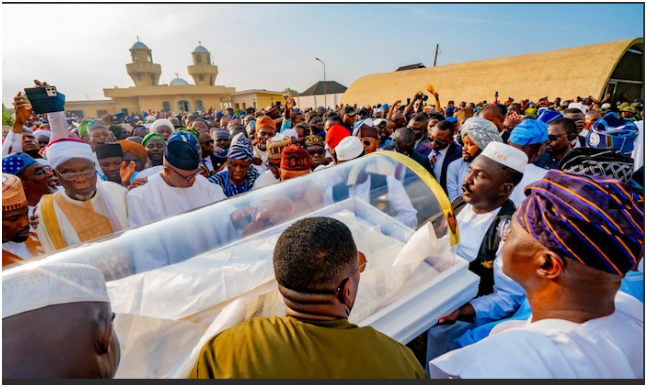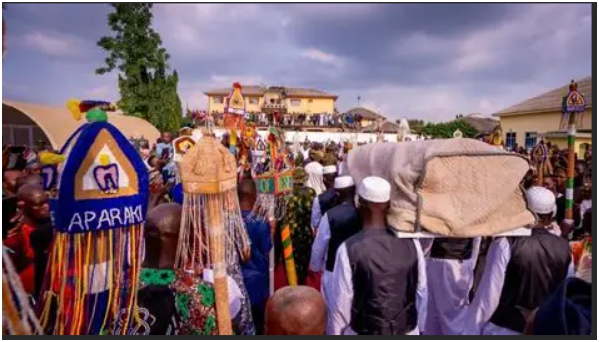Cultural Storm as Traditionalists Barred from Awujale’s Burial Sparks Religious and Customary Rift
🗓️ 16 July 2025
🖋️ Byline: IDNN Culture & Governance Desk
Ijebu-Ode, Ogun State – The burial of the late Awujale of Ijebuland, Oba Sikiru Adetona, has triggered a heated clash between traditionalists and the royal family after the monarch was laid to rest strictly under Islamic rites, with traditional religious groups barred from participating in the funeral ceremony.
The incident unfolded on Sunday at the Ogbagba Court residence in Ijebu-Ode, where soldiers reportedly escorted traditionalists away from the venue as Imams prepared for the Salatul Janazah (Islamic funeral prayer).
“This is a Muslim burial. Go back. We don’t want any trouble,” onlookers were heard shouting at the traditionalists in a video that has since gone viral.
Eyewitnesses said Mr. Adedire Adetona, the king’s first son, instructed that no traditional rites be performed, insisting that his father had always expressed a desire to be buried in accordance with his Islamic faith.

Royal Rights vs Cultural Rites
The exclusion of traditionalists has rekindled long-standing tensions between customary Yoruba burial protocols and the religious beliefs of royal families.
While traditionalists argue that kings — as cultural custodians — must undergo customary burial rites, the family countered that the Awujale formally rejected such rituals, having pushed for legal reforms protecting religious rights in royal succession and burial.
“Even without the king’s body, we will carry out the traditional rites for the land,” said a voice note purportedly from a senior Ijebu traditionalist, Elegura Ajisa.
The 2021 Ogun Burial Law: Adetona’s Legacy
In 2021, the Ogun State Government passed the “Obas, Chiefs, Council of Obas and Traditional Council Law”, affirming that monarchs have the right to be installed and buried according to their religious faith.
The law was championed by the late Awujale himself and signed into law by Governor Dapo Abiodun, during a public ceremony at the king’s palace.
The law has become central to the current controversy — cited by the royal family as the legal basis for excluding traditional rites from the Awujale’s final journey.
“He was buried according to his faith — that’s what the law allows, and that’s what the king always wanted,” a palace aide told IDNN.
Oluwo Backs Islamic Burial, Slams Pagan Rites
Backing the decision, Oluwo of Iwoland, Oba Abdulrosheed Akanbi, praised the burial format, stating that it freed Yoruba kings from “spiritual and physical oppression.”
“Any town that wants its king butchered after death should appoint an herbalist as ruler,” he said.
“As Oluwo, I broke my stool free from such bondage 10 years ago.”
Oluwo, known for his strong anti-traditionalist stance, has consistently called for the abolition of ritual killings, cannibalism, and corpse mutilation in the name of culture.
Traditionalists Fire Back: ‘This Is a Cultural Coup’
However, many traditionalists and cultural scholars see the event as a cultural desecration.
Veteran Ifa priest and actor Ifayemi Elebuibon criticized the burial, saying it undermines Yoruba spirituality, accusing some monarchs of serving foreign religious agendas.
“Oluwo lacks proper cultural orientation. He is acting like an agent of Saudi Arabia,” Elebuibon said, accusing him of eroding ancestral rites to please outsiders.

What Next for Yoruba Kingship Rites?
The Awujale’s burial has now become the latest flashpoint in the growing tension between faith and culture across Yorubaland — particularly over the burial of monarchs who are both religious adherents and cultural symbols.
With more Yoruba kings identifying as Christians or Muslims, analysts say the clash between personal faith and ancestral obligations is bound to intensify unless a clear consensus is reached.
